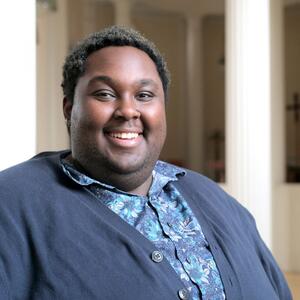
Jamal attended the University of Vermont as an undergraduate, studying neuroscience with the intention of becoming a doctor. A course in religious scholarship changed his path. For Jamal, religion offered a way to think about cultural history and societal issues, and a way to explore Christian identity and its meaning for those for whom “Christianity has been a space of violence, colonialism, shame.”
To make his calling not just theoretical but practical, Jamal thought about dual-degree programs in religion and social work. “I was interested in developing therapeutic skills, while also thinking through how to provide people with religious literacy as a component of community programming. It’s so critical that people think through their own development of spiritual identities, especially in a world that wants us to be leading increasingly individual and separate lives.”
Jamal began studying at YDS in the fall of 2020. After a year online, they attended and graduated from UConn’s School of Social Work during the 2021-2022 school year. Jamal is set to graduate from YDS in 2024 and is still thinking through long-term career plans. They expect to be ordained in their lifelong church, Union Baptist Church in Mystic, Conn., next year. Reflecting upon what he’s learned from his first church, he sees himself in a role that unites people. First, however, they’d like to work in higher education to further develop their capacity for this work.
“I think about organizations that aren’t functioning well because people aren’t connecting. Or I think about churches that are interested in repairing their relationship with their larger community. I want to go into that space and help people join together,” he says. “I would love to create something that helps people belong. I’m not entirely sure what that looks like yet, but I’m here to discern what that could mean.”
—John Curtis